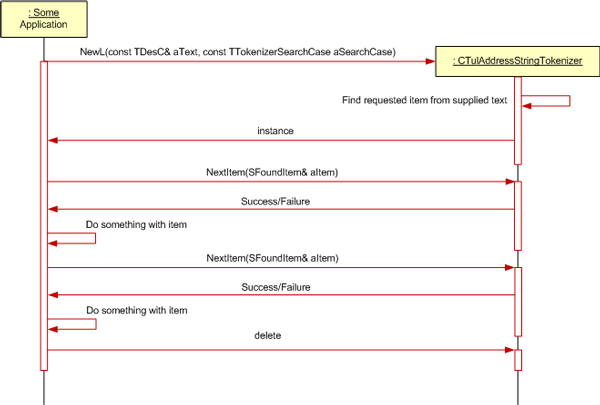Address string tokenizer overview
Purpose
The Address String Tokenizer offers methods for parsing phone numbers, E-mail addresses, URL and URI addresses from given text. It provides an interface for applications that, for example, want to create/use their own GUI for displaying found items.
Architectural Relationships
All functionality is implemented in the [[[ERROR: [NOKX000E] Unable to find definition for key reference 'CTulAddressStringTokenizer']]]CTulAddressStringTokenizer class.
The interface can be accessed through the tuladdressstringtokenizer.h file.
The binaries are linked to the etul.lib (Text Utilities -
part of Egul component) library.

Figure: Subsystem dependencies
Description
Usage
In
order to use the Address String Tokenizer, the user has to create an instance
of [[[ERROR: [NOKX000E] Unable to find definition for key reference 'CTulAddressStringTokenizer']]]CTulAddressStringTokenizer by
using the factory method [[[ERROR: [NOKX000E] Unable to find definition for key reference 'CTulAddressStringTokenizer']]]CTulAddressStringTokenizer::NewL().
For example:
CTulAddressStringTokenizer* addressStringTokenizer = CTulAddressStringTokenizer::NewL(text, searchCase);
The method takes two parameters of type TDesC& and [[[ERROR: [NOKX000E] Unable to find definition for key reference 'CTulAddressStringTokenizer']]]TTokenizerSearchCase which is
defined in tuladdressstringtokenizer.h.
The first parameter defines the text to be searched from.
The second parameter tells what exactly is being looked for. It is an enum which describes the type of text being searched for. The types available are phone number, email address, fixed start URL or generic URI.
The passed text is parsed
in construction, and found items can be fetched using the [[[ERROR: [NOKX000E] Unable to find definition for key reference 'CTulAddressStringTokenizer']]]ItemArray() method. [[[ERROR: [NOKX000E] Unable to find definition for key reference 'CTulAddressStringTokenizer']]]ItemArray() returns a constant
array containing all the found items.
The interface also offers helper functions for handling the item array by itself.
For more information
on individual methods, please see the reference API for [[[ERROR: [NOKX000E] Unable to find definition for key reference 'CTulAddressStringTokenizer']]]CTulAddressStringTokenizer.
Example
This sample code explains a few simple use cases that search for items from a text string:
// Some text
TBufC<256> strSomeText(_L("Mail to me@someplace.com or call 040 1234567.
You can also tune in to audio feed at rtsp://someplace.com/somefeed.ra."));
// SFoundItem instance
CTulAddressStringTokenizer::SFoundItem item;
// Create an instance of CTulAddressStringTokenizer and search for URLs.
CTulAddressStringTokenizer* singleSearch = CTulAddressStringTokenizer::NewL
(strSomeText, CTulAddressStringTokenizer::EFindItemSearchScheme);
// Get count of found items
TInt count(singleSearch->ItemCount());
// Get currently selected item (rtsp://someplace.com/somefeed.ra) to the result
// variable
singleSearch->Item(item);
TPtrC16 result(strSomeText.Mid(item.iStartPos, item.iLength));
// Deallocate memory
delete singleSearch;
// Look for all possible things (cases work as binary mask)
CTulAddressStringTokenizer* multiSearch = CTulAddressStringTokenizer::NewL
(strSomeText, (CTulAddressStringTokenizer::TTokenizerSearchCase)
(CTulAddressStringTokenizer::EFindItemSearchPhoneNumberBin |
CTulAddressStringTokenizer::EFindItemSearchURLBin |
CTulAddressStringTokenizer::EFindItemSearchMailAddressBin |
CTulAddressStringTokenizer::EFindItemSearchScheme));
// Debug print all items and their type
count = multiSearch->ItemCount();
multiSearch->Item(item);
for(TInt i=0; i<count; i++)
{
result.Set(strSomeText.Mid(item.iStartPos, item.iLength));
RDebug::Print(_L("Found type %d item:"), item.iItemType);
RDebug::Print(_L("%S"), &result)
multiSearch->NextItem(item);
}
// Deallocate memory
delete multiSearch;
Sequence Diagram

Figure: Sequence of events for CTulAddressStringTokenizer